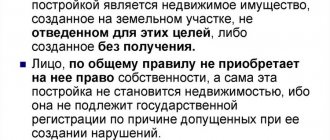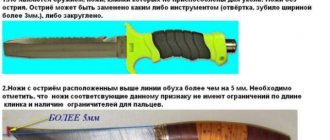1. Careless storage of a firearm, which created conditions for its use by another person, if this resulted in the death of a person or other grave consequences, -
shall be punishable by a fine in the amount of up to one hundred thousand rubles, or in the amount of the wages or other income of the convicted person for a period of up to six months, or by compulsory labor for a term of up to three hundred and sixty hours, or by corrective labor for a term of up to one year, or by restriction of liberty for a term of up to one year. , or arrest for up to six months.
2. The same act, resulting in the death of two or more persons, -
shall be punished by compulsory labor for a term of up to four hundred eighty hours, or correctional labor for a term of up to two years, or imprisonment for a term of up to two years.
- Article 223.1. Illegal manufacture of explosives, illegal manufacture, alteration or repair of explosive devices
- Article 225. Improper performance of duties for the protection of weapons, ammunition, explosives and explosive devices
Commentary to Art. 224 of the Criminal Code of the Russian Federation
The object of the crime is public safety in the area of firearms trafficking.
The subject of the crime is a firearm lawfully in the possession of a person.
The objective side of the crime is expressed in careless storage of firearms, which created conditions for its use by another person, if this resulted in grave consequences.
The rules for storing weapons are determined by the Law on Weapons and Decree of the Government of the Russian Federation of July 21, 1998 N 814 “On measures to regulate the circulation of civilian and service weapons and cartridges for them on the territory of the Russian Federation,” as well as a number of other regulatory legal acts.
———————————
NW RF. 1998. N 32. Art. 3878.
Thus, in accordance with the Instructions for organizing the work of internal affairs bodies to control the circulation of civilian and service weapons and ammunition on the territory of the Russian Federation, approved by the Order of the Ministry of Internal Affairs of Russia dated April 12, 1999, citizens of the Russian Federation must store weapons and ammunition at their place of residence , as well as in places where they are kept in safes, locked metal cabinets or boxes made of high-strength materials or in wooden boxes lined with iron.
———————————
Bulletin of normative acts of federal executive authorities. 1999. N 32.
When checking the storage conditions of weapons and ammunition held by citizens of the Russian Federation, employees of internal affairs bodies find out:
a) compliance of existing weapons with issued licenses and permits, as well as ammunition stored by citizens with the types and models of registered weapons;
b) the presence of a lockable safe, a metal cabinet, a box made of high-strength materials or a wooden box lined with iron;
c) conditions that exclude access to weapons by unauthorized persons (storing weapons in an isolated room, installing a metal or iron-clad door, equipping with additional locking devices, alarm systems, the procedure for storing keys to a safe, cabinet or drawer).
Thus, if the weapon was stored openly, not in a safe cabinet, or if family members of the owner of the weapon or other persons had access to the keys to the safe, then if the weapon is used by unauthorized persons and the consequences stipulated by the crime occur, the owner of the weapon is held liable under Art. . 224 of the Criminal Code of the Russian Federation.
The elements of the crime are material; grave consequences include, for example, the use of a weapon by an unauthorized person to commit a crime against life and health, property or a similar socially dangerous act (for example, a minor or an insane person took possession of a carelessly stored weapon and used it to commit an act against a person).
The subjective side of the crime is characterized by carelessness in the form of frivolity or negligence.
The subject of the crime may be the owner or legal possessor of a firearm who has reached the age of sixteen.
Consultations and comments from lawyers
The subject of a crime under Article 224 can be a person:
- Must be over 16 years of age.
- Sane.
- Who legally owns a firearm.
If a person owns a weapon illegally, the criminal act should be classified under Art. 222 of the Criminal Code.
If the weapon was entrusted to the person under protection, liability arises under Art. 225 of the Criminal Code. In addition, as can be seen from the above example of judicial practice, there is an erroneous classification in cases of independent transfer of weapons.
If there are violations of the rules for collecting weapons, this crime is classified under the Code of Administrative Offenses of the Russian Federation.
Judicial practice under Article 224 of the Criminal Code of the Russian Federation
Determination of the Judicial Collegium for Civil Cases of the Supreme Court of the Russian Federation dated September 18, 2018 N 117-KG18-39
by the Resolution of the investigator of the inquiry department of the Ministry of Internal Affairs of Russia for the Gagarinsky district of Sevastopol dated November 26, 2015 in initiating a criminal case against S.N. Secretarenko. refused due to the lack of corpus delicti under Part 1 of Article 224 of the Criminal Code of the Russian Federation (careless storage of a firearm that created conditions for its use by another person, if this resulted in the death of a person or other grave consequences).
Appeal ruling of the Appeal Board of the Supreme Court of the Russian Federation dated 03/02/2021 N APL21-18
From the case materials, it is clear that by the verdict of the Moscow City Court of February 29, 1996, taking into account the changes made to the verdict by the ruling of the Judicial Collegium for Criminal Cases of the Supreme Court of the Russian Federation of May 26, 1997, T.S. convicted of a combination of crimes provided for in paragraphs “a”, “e”, “h”, “i”, “n” of Article 102, part 3 of Article 147, paragraphs “a”, “b”, “c”, “e” Part 2 of Article 146, Part 3 of Article 224 of the Criminal Code of the RSFSR, Part 2 of Article 209, Part 2 of Article 325 of the Criminal Code of the Russian Federation, to an exceptional punishment - the death penalty.
Decision of the Supreme Court of the Russian Federation dated November 23, 2020 in case No. AKPI20-739
As follows from the case materials, according to the verdict of the Moscow City Court dated February 29, 1996, taking into account the changes made to the verdict by the ruling of the Judicial Collegium for Criminal Cases of the Supreme Court of the Russian Federation dated May 26, 1997, T.S. convicted of a combination of crimes provided for in paragraphs “a”, “e”, “h”, “i”, “n” of Article 102, part 3 of Article 147, paragraphs “a”, “b”, “c”, “e” Part 2 of Article 146, Part 3 of Article 224 of the Criminal Code of the RSFSR, Part 2 of Article 209, Part 2 of Article 325 of the Criminal Code of the Russian Federation, to an exceptional punishment - the death penalty.
Resolution of the Plenum of the Supreme Court of the Russian Federation dated June 11, 2019 N 15
"2. Taking into account the provisions of Articles 1 and 2 of the Federal Law “On Weapons” in relation to Articles 222, 223, 224 - 226.1 of the Criminal Code of the Russian Federation, firearms should be understood as all types of military, service and civilian firearms, including those manufactured in a homemade manner, structurally intended for mechanical destruction of a living or other target at a distance by thrown equipment that receives directional movement due to the energy of a powder or other charge. These include rifles, carbines, pistols and revolvers, hunting and sporting rifles, machine guns and machine guns, mortars, grenade launchers, artillery pieces, cannons, as well as other types of firearms, regardless of caliber.
Acquittal of a convicted person under Article 242-1 of the Criminal Code of the Russian Federation
By this ruling, the Moscow City Court confirmed the legality of the verdict of the Zyuzinsky District Court of Moscow, which acquitted the client, lawyer P.A. Domkin. on charges of committing a crime under Article 242.1. Criminal Code of the Russian Federation.
Case No. 10-20763/18
APPEAL DECISION
(EXTRACT)
Moscow city, December 05, 2021
Judicial panel for criminal cases of the Moscow City Court consisting of:
presiding judge Fedorova S.V.,
judges Guchenkova E.A., Zaurbekova Yu.Z.,
with the secretary of the court session Sh.L.K.,
with the participation of the prosecutor of the appeal department of the criminal justice department
Department of the Moscow City Prosecutor's Office Z.A.V.,
defense lawyer - lawyer P.A. Domkin, who presented certificate No. 12171 and warrant No. 12, acquitted by X.
considered in a closed court session the appeal presentation of state prosecutor K.S.V. on the verdict of the Zyuzinsky District Court of Moscow dated October 16, 2021, by which
X, 19... year of birth, native of the city X, citizen of the Russian Federation, registered at the address:...., previously unconvicted,
acquitted of the charge of committing a crime under paragraph “a” of Part 2 of Art. 242.1 of the Criminal Code of the Russian Federation, on the basis of i. 3 parts 2 tbsp. 302 of the Code of Criminal Procedure of the Russian Federation due to the lack of corpus delicti in his actions.
Based on Art. 134 of the Code of Criminal Procedure of the Russian Federation recognized the right to rehabilitation for X.
The preventive measure in the form of house arrest has been cancelled.
The fate of the material evidence was decided by the verdict.
Having heard the report of Judge E.A. Guchenkova, and having heard the participants in the process on the arguments of the appeal presentation, the judicial panel
INSTALLED:
Preliminary investigation authorities accuse X. of acquiring, storing for the purpose of distribution and distributing materials with pornographic images of minors, including persons under fourteen years of age.
The court, having questioned the witnesses, X., having examined the evidence presented, came to the conclusion that in X’s actions there was no corpus delicti under paragraph “a” of Part 2 of Art. 242.1 of the Criminal Code of the Russian Federation, and ruled an acquittal.
In the appeal with additions, State Prosecutor X. expresses disagreement with the verdict, considers it illegal and unfounded, subject to cancellation, due to the inconsistency of the court's conclusions set out in the verdict, the actual circumstances of the criminal case established by the court of first instance, a significant violation of the criminal procedural law and improper application of criminal law. He believes that the court did not comply with the explanations set out in the Resolution of the Plenum of the Supreme Court of the Russian Federation No. 55 of November 29, 2016. The circumstances established by the court contradict the actual circumstances of the criminal case, the testimony of X. himself at the court hearing and at the preliminary investigation.
Believes that the violations of criminal procedure and criminal laws committed by the court cannot be eliminated in the court of appeal.
Taking into account the above, he requests that the verdict be quashed and the criminal case transferred for a new trial in the same court.
In objections to the appeal presentation, lawyer P.A. Domkin considers the verdict to be legal, justified and motivated, the arguments of the appeal are untenable, and therefore requests the acquittal against X. to be left unchanged, the appeal to be rejected.
At the court hearing, prosecutor Z. supported the appeal, asked to cancel the court verdict based on the arguments set out in it, and to transfer the criminal case for a new trial in the same court, in a different composition of the court.
The acquitted X. and the defense lawyer Domkin objected to the arguments of the appeal and asked for the verdict to be left unchanged.
Having checked the materials of the criminal case, having discussed the arguments set out in the appeal and objections to it, the judicial panel finds no grounds for overturning the court's acquittal.
As follows from the minutes of the court hearing, the court examined all the evidence presented, in accordance with the requirements of Art. 305 of the Code of Criminal Procedure of the Russian Federation set out in the verdict the circumstances of the criminal case established by it, the grounds for acquitting the defendant and the evidence confirming these grounds, as well as the reasons for which he rejected the evidence presented by the prosecution. At the same time, the court, in accordance with the provisions of the criminal procedure law, considered all the petitions submitted by the parties and for each of them a reasoned decision was made based on the examined evidence.
During the trial, the court examined and cited in detail in the verdict both the evidence presented by the prosecution and the evidence presented by the defense.
In particular, the court examined the evidence of the prosecution: the testimony of witnesses M., B., S., M., as well as written materials of the criminal case, including: ...
Contrary to the arguments of the appeal, the court reasonably came to the conclusion that the prosecution did not present evidence that indisputably testifies to the presence of elements of the crime charged in X.’s actions, and the evidence presented by the prosecution, including testimony of witnesses, as well as written evidence, are not evidence of X’s guilt in committing a crime.
The verdict provides a detailed analysis of all the evidence. At the same time, the court, having assessed the evidence examined at the court hearing from the point of view of its admissibility, reliability and relevance, both individually and collectively from the point of view of sufficiency to resolve the case on the merits, came to the conclusion that the evidence presented by the prosecution do not form a totality indicating the presence of elements of the specified crime in X.’s actions, while the court, in acquitting X. of the charges brought, assessed written evidence that reflects the conduct of a number of procedural and investigative actions, along with the testimony of persons interrogated in court.
Thus, the court correctly indicated that in this case the following circumstances were reliably established: ...
These facts are confirmed by the totality of evidence examined during the judicial investigation.
At the same time, the judicial panel, having studied the materials of the criminal case, agrees with the conclusions of the court of first instance that the actions imputed by the preliminary investigation body to X., namely that he, having access to the Internet through the program installed on his computer, “ iMul”, downloaded for the purpose of storage and subsequent distribution on a personal computer belonging to him... video recordings related to pornographic materials containing pornographic images of minors, including persons under 14 years of age, which he stored in the memory of his computer with the following inside: a hard magnetic drive, a solid-state drive, and a hard drive; for the purpose of distributing pornographic materials, provided free access to the above ... video recordings of an unlimited number of Internet users who have the iMule program installed on their computers, are not supported by the evidence presented by the prosecution.
As it was established by the court of first instance during the judicial investigation, the testimony of witnesses - attesting witnesses M. and B. confirm the fact of the 20... year operational search activity “inspection of residential premises” at the place of residence of X., but they do not know how the files, containing videos of a pornographic nature, were received by X. and whether they were distributed by the latter.
Testimony of witnesses - operational employees... The Ministry of Internal Affairs of Russia for Moscow S. and M. confirm the fact of receiving information regarding unidentified persons living in the territory of .... Moscow, about the distribution of pornographic materials depicting minors using the Internet, the circumstances of the preparation and conduct of the operational investigation “inspection of residential premises” at X.’s place of residence, as well as the sending of seized items for research, while they are not reliably aware of the distribution namely X. from a personal computer, discovered and seized at his place of residence, pornographic materials.
In addition, from the testimony of witness S., it follows, according to X., that pornographic materials were distributed by a program installed on the computer, while the corresponding video files were freely available only to those who had this program installed.
….
Thus, none of the witnesses questioned, both during the preliminary investigation and during the trial, nor the examined written evidence, as the court of first instance correctly established, indicates that X. acquired and stored for the purpose of distributing materials from pornographic information, including images of minors and persons under 14 years of age, that he has committed any active actions aimed at distributing pornographic information prohibited by law; There is no evidence that the files stored on X.’s computer were obtained by third parties as a result of his deliberate actions, and not as a result of the installed computer program “iMul,” which allows them to be downloaded and distributed to other users automatically.
The court, contrary to the arguments of the appeal, analyzed the testimony of X. himself at the preliminary investigation and at the court hearing, as well as the information contained in the protocol of his confession, and they justifiably gave a critical assessment to the extent that they were refuted by the totality of the examined evidence, which does not raise doubts among the judicial panel.
The protocol of the court session corresponds to the course of the trial, the testimony of all persons interrogated in the court of first instance is set out in the court verdict and they were given a proper assessment, which does not raise doubts among the judicial panel.
Thus, taking into account all the examined evidence, the court came to a reasonable and motivated conclusion that the preliminary investigation authorities and the prosecution did not present sufficient and reliable evidence at the court hearing of the presence in the actions of X. of the crime provided for in paragraph "a" part .2 art. 242.1 of the Criminal Code of the Russian Federation, taking into account the provision of the law that all doubts about the guilt of the accused that cannot be eliminated, in accordance with the provisions of Art. 14 of the Code of Criminal Procedure of the Russian Federation are interpreted in favor of the accused.
The panel of judges agrees with the conclusions of the court of 1st instance, set out in the verdict, according to which the prosecution’s arguments about the illegality of X.’s actions did not find their objective
confirmation, since such conclusions are based only on the evidence examined during the trial, the case was considered by the court fully and objectively, and therefore the arguments of the appeal are untenable.
The correctness of the assessment of the evidence collected in the case, given by the court of first instance in the verdict, does not raise any doubts among the judicial panel.
The court of first instance did not commit any violations of the requirements of the criminal procedural law that entailed the cancellation or modification of the sentence. Contrary to the arguments of the appeal, in accordance with the requirements of the Code of Criminal Procedure of the Russian Federation, following the results of the trial, the court reasonably ruled an acquittal, while the court correctly indicated in the operative part of the verdict the basis for acquittal, provided for in paragraph 3 of Part 2 of Art. 302 of the Code of Criminal Procedure of the Russian Federation - absence of corpus delicti in the act.
Under such circumstances, the judicial panel does not find grounds to satisfy the appeal based on the arguments set out in it.
Based on the above, guided by art. Art. 389.20; 389.22: 389.28; 389.33 Code of Criminal Procedure of the Russian Federation, judicial panel
DEFINED:
The verdict of the Zyuzinsky District Court of Moscow dated October 16, 2018: in relation to X. is left unchanged, the appeal is not satisfied.
Chairman:
Judges:
Practice of application of Article 242.1 of the Criminal Code of the Russian Federation
Responsibility for distributing pornography on the Internet using torrent clients
Commentary on Article 225 of the Criminal Code of the Russian Federation
1. For the characteristics of the subject of the crime, see the commentary to Art. 222 of the Criminal Code.
2. The objective side of the crime is characterized by three mandatory features:
1) improper performance by a person of his duties to protect firearms and other items;
2) the onset of consequences in the form of theft, destruction of the subject of the crime or other grave consequences;
3) a causal connection between the improper performance of these duties and the socially dangerous consequences that occur.
3. Improper fulfillment of the obligation to protect the specified items consists of a person’s failure to perform those actions that he was obliged to perform by virtue of the work entrusted to him to ensure their safety, or in a dishonest attitude towards the performance of his duties.
4. Other serious consequences include causing harm to human health, causing death, causing property damage, committing a crime with a stolen weapon, etc.
5. The crime is considered completed from the moment the socially dangerous consequences occur.
6
The subjective side of the crime is characterized by a careless form of guilt.
7. Special subject of a crime - a person who has reached the age of 16 and who is entrusted (by virtue of his position, work performed, by contract, special assignment, etc.) with the responsibilities of protecting firearms, explosives and explosive devices.
8. According to Part 2 of the commented article, the subject of the crime is nuclear, chemical or other types of weapons of mass destruction or materials or equipment that could be used in the creation of weapons of mass destruction.
According to the generalized concept of a weapon of mass destruction, this is any type of weapon of indiscriminate action, the use of which is capable of causing death to an indefinite number of people.
Nuclear weapons include a set of ammunition, means of delivery and control (nuclear charge, bomb, missile warhead, etc.). The action of nuclear weapons is based on a giant explosion due to the release of energy due to the lightning-fast splitting of the atomic nucleus.
The damaging factors of an explosion are light radiation, shock wave, penetrating radiation and radioactive radiation. Chemical weapons are highly toxic toxic substances, means of their use and delivery.
The damaging properties of chemical weapons are based on the toxic effects of chemical compounds that are in an aerosol, vapor, gaseous or liquid state, which can penetrate the human body through the skin, respiratory system, digestive tract, mucous membranes and lead to death in a short time.
Other types of weapons of mass destruction are biological and toxin weapons.
9. A crime, the subject of which is a weapon of mass destruction, is recognized as completed from the moment of the onset of grave consequences (material composition) or the threat of their occurrence (concrete danger).
10. Serious consequences include radioactive and chemical contamination of the environment, mass death of people, etc.
11. The subjective side of the crime involves a careless form of guilt.
12. Special subject of a crime - a person who has reached the age of 16 and who is entrusted with the responsibility for the protection of nuclear, chemical or other types of weapons of mass destruction or materials or equipment.







